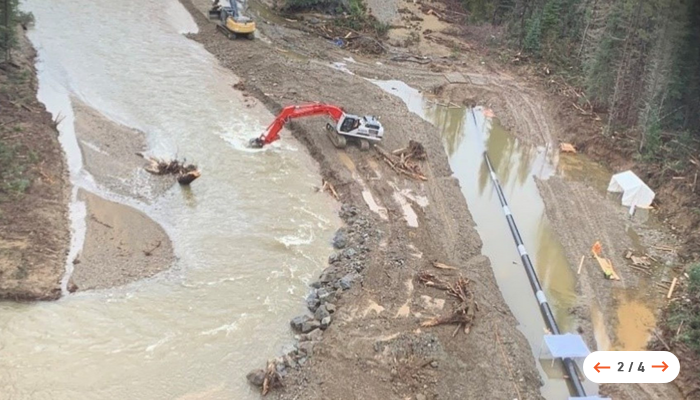Fraser Valley/Calgary – From the December 2 media release -Trans Mountain is bracing for more rain and snow, but not the extent from what the past two weeks has brought.
A full re-start has yet to be announced:

December 1, 2021, 11:30 am PDT
With continued storms bringing heavy rain causing water accumulation, crews are continually monitoring and assessing the pipeline and so far, there are no new areas of concern caused by the weather conditions. Where work has been done to shore-up banks, we are making improvements such as berm fortification to ensure the work already done is holding.
Trans Mountain has brought-in more than 44,000 cubic metres of rock and gravel at critical sites and deployed several hundred sandbags to assist with shoring-up banks in flooded areas to allow the required assessment and repair work to continue. Crews are utilizing 30 sets of pumps and hoses to manage water accumulation and have set up 15 separate light-stands with generators to allow monitoring and work to continue around the clock.
We are continually assessing conditions in the region and are deploying additional resources where necessary. More than 470 people, six helicopters and some 100 pieces of heavy equipment, including three pieces of snow maintenance equipment and three sidebooms are in the Coquihalla and Coldwater regions to support getting the pipeline restarted.
We have natural hazard assessments ongoing and are focused on supporting our field teams who are working day and night in dynamic wet weather conditions near high-energy river flows. Safety of our crews and protection of the pipeline system remain our top priorities and despite the adverse conditions we are moving forward with work necessary to safely restart the pipeline.
Provided there are no additional setbacks from the latest round of rainstorms, Trans Mountain will soon complete work that needs to be done before a restart can take place. Based on current conditions and the amount of progress we have been able to make, we are only a few days away from restarting the pipeline at a reduced capacity.







